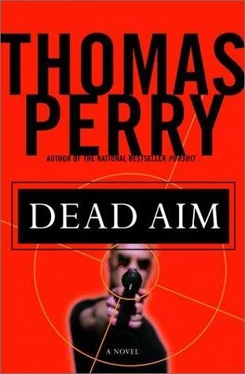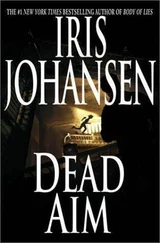Thomas Perry - Dead Aim
Здесь есть возможность читать онлайн «Thomas Perry - Dead Aim» весь текст электронной книги совершенно бесплатно (целиком полную версию без сокращений). В некоторых случаях можно слушать аудио, скачать через торрент в формате fb2 и присутствует краткое содержание. Жанр: Триллер, на английском языке. Описание произведения, (предисловие) а так же отзывы посетителей доступны на портале библиотеки ЛибКат.
- Название:Dead Aim
- Автор:
- Жанр:
- Год:неизвестен
- ISBN:нет данных
- Рейтинг книги:4 / 5. Голосов: 1
-
Избранное:Добавить в избранное
- Отзывы:
-
Ваша оценка:
- 80
- 1
- 2
- 3
- 4
- 5
Dead Aim: краткое содержание, описание и аннотация
Предлагаем к чтению аннотацию, описание, краткое содержание или предисловие (зависит от того, что написал сам автор книги «Dead Aim»). Если вы не нашли необходимую информацию о книге — напишите в комментариях, мы постараемся отыскать её.
Dead Aim — читать онлайн бесплатно полную книгу (весь текст) целиком
Ниже представлен текст книги, разбитый по страницам. Система сохранения места последней прочитанной страницы, позволяет с удобством читать онлайн бесплатно книгу «Dead Aim», без необходимости каждый раз заново искать на чём Вы остановились. Поставьте закладку, и сможете в любой момент перейти на страницу, на которой закончили чтение.
Интервал:
Закладка:
“We’ll be looking into all of that. Right now I’d like to find out more about you, Mr. Mallon. You’re the sort of guy who stimulates my curiosity. You seem to have a whole lot of money, but you retired some time ago. Is that right?”
“Yes,” said Mallon.
“At what age? About thirty-five?”
“Thirty-eight.” He resigned himself to the fact that he was going to have to go through all the details. “I worked in the parole office in San Jose, for about four years.”
“You were a cop? What happened?”
“I decided it wasn’t for me. I went into it with the idea that what I was going to do was help people who needed it. After four years, it still didn’t seem to be happening. So I quit.”
“I can understand that,” said Diehl. The expression on his face was ambiguous.
“Then I went into construction. It was a good, steady business for about twelve years, and it was getting better. I got into developing housing projects. Then my wife started divorce proceedings. Her lawyers wouldn’t accept a half interest in the company. They insisted that I cash her out. I had already borrowed all I could to finance the projects I was doing, so there was nothing I could do but sell, and divide the proceeds. We happened to be at the beginning of a boom, and at that moment I was in phase one of a development called Old Greenridge Ranch. A couple of much bigger companies wanted that location. The area was growing so fast that they couldn’t build quickly enough to keep up with the demand without gobbling up some companies like mine, and keeping the crews on the job. So one of them made a preemptive offer that was more than I’d ever imagined I would get.”
“What happened then?” asked Diehl.
“I bought a three-bedroom house in Santa Barbara, and put the rest of the money into investments. For ten years I’ve spent most of my days going places on foot or reading books from the public library. If I go out at night it’s usually to concerts or lectures at the university, or maybe a movie. I have about four really good sport coats and five pairs of expensive walking shoes. I replace maybe one of them a year. It doesn’t cost much to live that way, so the money stayed invested and I got a lot richer in ten years.”
Diehl said, “You’re lucky.” He stared at his coffee cup. “Or maybe you’re a genius.” He looked up to watch Mallon as he said, “I know some guys who went into construction at about the same time you did. They worked really hard, and they seem to still have plenty of work. But they tell me they’re not ready to retire even now.”
“You’re right. I was lucky,” said Mallon. “It didn’t feel like luck at the time. It felt like a disaster. But at the end of it, I had a lot of money.”
Diehl sighed impatiently. “You’ve got to help me here. There is absolutely no question in anybody’s mind now that people have made attempts to kill you. My question to you is just this: have you told us every reason you can imagine for them to do that? Something left over from the construction business, maybe?”
“I’ve told the police here and in Santa Barbara everything I know,” Mallon said. “I think it has to do with the death of Catherine Broward, and the murder of her boyfriend before that, not with me, or a business I sold years ago.”
Diehl looked at him for a few seconds, his eyes still sad and tired and red. Then he placed both hands on the table and pushed himself to his feet as though it were a difficult exercise. “Then you may as well go. We’ll be looking into everything you’ve told us. If we learn anything about the two bodies we have, we’ll let you know. Meanwhile, try to take precautions so this doesn’t happen again.”
“You’re saying that you won’t do anything to protect me.”
“The only way I can protect you is by breaking this case.” He held his empty hands out from his sides. “That’s all I have.” Then he turned and went out the door.
CHAPTER 27
It was morning when Mallon was allowed to leave the station. He took a taxi to the airport, rented a car, and checked into a hotel on Century Boulevard. He sat on the big bed, took out the telephone book, looked up the nonemergency numbers of the police department, and began calling various divisions. After his third call, he found that Angela Berwell was assigned to homicide in Hollywood. He wrote the number on the small pad by the phone, then dialed it.
When he heard the call connect, a female voice said, “Hollywood.” He shoved the sheet with the number into his pocket.
“I’d like to speak with Detective Berwell, please.”
After half a minute, Mallon heard, “Homicide, Berwell.”
He said, “Detective Berwell, this is Robert Mallon. Do you remember me? Lydia Marks and I met with you a few weeks ago.”
“Yes, Mr. Mallon. Of course I remember. I’ve been trying to get in touch with you for days, since Lydia was killed. Are you all right?”
Her voice seemed so sympathetic, so calm and sane. Every other police officer he’d talked to since the beginning had seemed to suspect him of hiding something, or think he was crazy. “I’m not hurt or anything,” he said, “but I seem to have become the next target.”
“I heard about what happened at the hotel just a little while ago when I came on duty.” Her voice became quieter. “Listen, Lydia’s death and what’s happened to you aren’t part of my caseload-didn’t even happen in my precinct-but I’d like to talk to you. I’ll bet you’ve had your fill of police stations, so why don’t you meet me somewhere?”
“I’d like to.” He knew the relief must be audible in his voice. “Where and when?”
“Meet me on the corner of Wilshire and Fairfax at noon. We can walk and talk, maybe go somewhere quiet for lunch.”
“Great,” he said. “I’ll be there.”
By the time he had showered and dressed it was nearly eleven. He had no idea how long it would take him to drive to Wilshire and Fairfax. Sometimes the San Diego Freeway was so slow that it might be an hour or more. He went downstairs to his rental car and drove.
As he merged into the northbound side of the freeway, he tried to sort out what was happening. It was possible that Detective Berwell would tell him something that would indicate his predicament was about to improve, but he doubted it. He hoped that talking with her would at least provide him with an advocate on the Los Angeles police force. Even if she was only willing to help him because she wanted to find Mark Romano’s killer, it didn’t matter.
The traffic was moving smoothly, and it took him less than a half hour to reach the corner where he had agreed to meet Detective Berwell. Since he was so early, he drove up and down a few of the streets near the intersection of Wilshire and Fairfax, killing time and looking for the best place to park. Finally, he drove along Sixth Street behind the L.A. County Museum of Art, intending to find a space in the parking lot up the street and walk toward Fairfax. But on Sixth, just before he reached Curson, he found a space and took it. As he was about to get out of the car he looked up South Curson. It led into Park La Brea, a large apartment complex. Inside the entrance, he saw something that puzzled him. In the circle at the end of South Curson were two plain vans, one blue and the other white, stopped at the curb with their motors running. Each had a driver sitting behind the wheel and two other men loitering nearby. A few feet ahead of them was a car with another driver waiting behind the wheel and a person beside him.
Mallon decided not to get out of his car yet. He sat and waited. It seemed an odd gathering to him. Neither van had any markings to indicate that it was from a delivery company or a repair service. Maybe he was being overly jumpy, but who were these men, and what were they waiting for? Almost certainly there was some dull, benign explanation, but what was it?
Читать дальшеИнтервал:
Закладка:
Похожие книги на «Dead Aim»
Представляем Вашему вниманию похожие книги на «Dead Aim» списком для выбора. Мы отобрали схожую по названию и смыслу литературу в надежде предоставить читателям больше вариантов отыскать новые, интересные, ещё непрочитанные произведения.
Обсуждение, отзывы о книге «Dead Aim» и просто собственные мнения читателей. Оставьте ваши комментарии, напишите, что Вы думаете о произведении, его смысле или главных героях. Укажите что конкретно понравилось, а что нет, и почему Вы так считаете.












